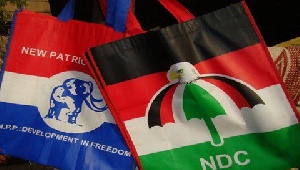Politics in Ghana is now very expensive, to the extent that it takes a lot of money even to be defeated in an election. The reasons are not far-fetched. The parliamentary primaries of both NPP and NDC, for instance, are very much monetized.
A lot of cash was doled out for delegates to vote for particular candidates. Massive vote buying was also alleged during the 2020 general election. This situation is very dangerous for our democracy as it makes it possible to elect the wrong people who have more money or are supported by some financially powerful people –political patronage.
It is therefore important to ask questions about the sources of such vote buying moneys as it can have adverse effect on the welfare of the people. This debate is not new but to this day we still have a very limited and uncertain sense of the real sources of their funding.
Although there is a Political Parties Act, 2020 (Act 574), which regulates the financing of political parties’ activities, it is common knowledge that political parties support their parliamentary candidates financially during elections with membership dues and donations.
But it is also common knowledge that, parliamentary candidates do not solely depend on their parties, they have other sources. When there is a failure to regulate the use of money in the political process, it can undermine the credibility of elections.
The infamous practice goes on because election stakeholders pay more attention election fairness at the expense of transparency and integrity. All what the citizens are interested in is “we have a free and fair election”. I believe this a major reason why we cannot fight corruption collectively.
The media has a duty to find out how elected politicians financed their campaigns. It is time for the media to deprive elected politicians the aura of mystery and above-the-law tendencies that they have exhibited over the years. The fact that the law is silent on this does not mean we should not know who supported their campaign financially.
The purpose of calling for disclosure of the sources of their funds is to inoculate the political system against corruption. In other words, it is about preventing the naked purchase of public decisions by a single donor. It is time for the role of money in politics to be effectively regulated, and there is no better way to do it than to start with members of parliament (the enactors of our laws).
Is Public funding the way out?
Proponents of public funding argue that it reduces the temptation for political candidates to over spend on political activities or elections. However, some uneasiness has been expressed about the effect that disclosure might have on the willingness of donors to contribute to candidates. Election financiers simply do not want to be known to be the financiers in order to avoid public and media scrutiny.
They may in some cases fear they will be discriminated against in the award of government contracts. The question therefore is whether the aforementioned issues and loss of privacy can be justified on the basis of preventing public policies being captured by an individual which might lead to corrupt acts.
The way forward
The reason for proposing and supporting transparency and accountability in the financing of political party activities is to expose how parliamentary aspirants raise funds for their campaigns. There is a school of thought which argues that the time is not ripe for state-funding of parliamentary candidates, given the economic challenges of the country.
But will there ever be a ripe time? I think there should be renewed debate on the real sources of resources of funding for the campaigns of elected politicians.
It could be an important way of tackling corrupt practices. I stand with those who call for the establishment of mechanisms of accountability, transparency, and disclosure of the financial management of all candidates. It is a guard against corruption and improper influence.
This write-up is to help check corruption and political patronage and to ensure sanctity in our elections. The underlying objective is to make sure that the right people are elected into public positions.
Opinions of Tuesday, 19 January 2021
Columnist: Pearlvis Atsu Kuadey
The sources of funds of elected politicians: the shroud of democracy
 The two main political parties, New Patriotic Party (NPP) and the National Democratic Congress (NDC)
The two main political parties, New Patriotic Party (NPP) and the National Democratic Congress (NDC)


















